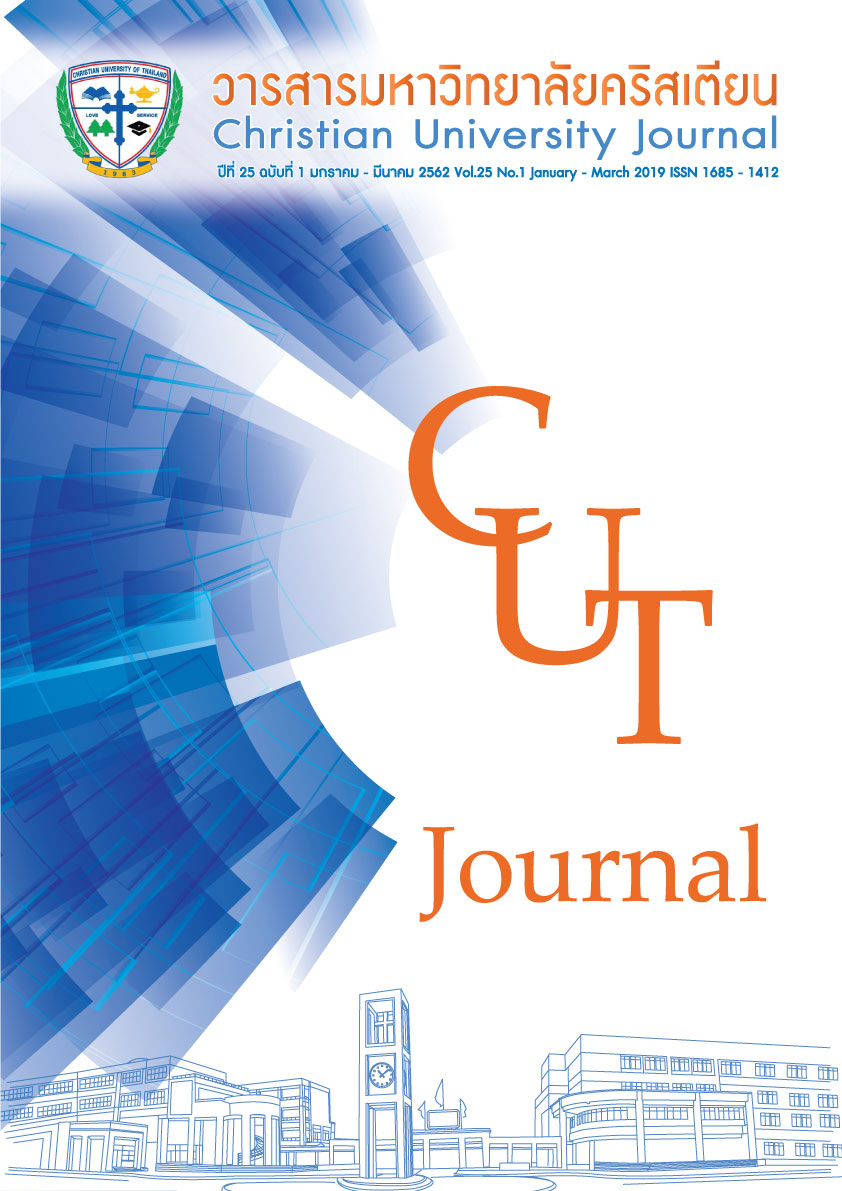การเสริมสร้างความสุขของผู้ป่วยมะเร็งโดยรูปแบบการให้คำปรึกษารายบุคคลแบบบูรณาการ
คำสำคัญ:
ตัวบ่งชี้ความสุข, ผู้ป่วยมะเร็ง, รูปแบบการให้คำปรึกษารายบุคคลแบบบูรณาการบทคัดย่อ
การวิจัยในครั้งนี้มีวัตถุประสงค์ 1) เพื่อพัฒนาตัวบ่งชี้ความสุขของผู้ป่วยมะเร็ง 2) เพื่อสร้างรูปแบบการให้คำปรึกษารายบุคคลแบบบูรณาการเพื่อเสริมสร้างความสุขของผู้ป่วยมะเร็ง และ 3) เพื่อเปรียบเทียบความสุขของผู้ป่วยมะเร็งก่อนการทดลอง หลังการทดลอง และหลังการติดตามผลโดยรูปแบบการให้คำปรึกษารายบุคคลแบบบูรณาการ กลุ่มตัวอย่างประกอบด้วย 2 กลุ่ม ได้แก่ กลุ่มที่ 1 เป็นผู้ป่วยมะเร็งระยะที่ 2 และ 3 ที่ได้รับการรักษาด้วยยาเคมีบำบัดและ/หรือรังสีรักษา ณ แผนกผู้ป่วยในของโรงพยาบาลแห่งหนึ่งในจังหวัดปทุมธานี จากการสุ่มเลือกแบบเจาะจง จำนวน 65 คน กลุ่มที่ 2 เป็นผู้ป่วยที่ได้จากการสุ่มเลือกจากกลุ่มที่ 1 จำนวน 7 คน เป็นกลุ่มทดลองที่ได้รูปแบบการให้คำปรึกษารายบุคคลแบบบูรณาการ เครื่องมือที่ใช้ในการเก็บข้อมูล ได้แก่ แบบวัดความสุขของผู้ป่วยมะเร็ง พัฒนาจากการใช้เทคนิคเดลฟายโดยผู้เชี่ยวชาญ จำนวน 18 คน เป็นแบบมาตราส่วนประมาณค่า มีความเชื่อมั่นทั้งฉบับเท่ากับ .95 เครื่องมือที่ใช้ในการทดลอง ได้แก่ รูปแบบการให้คำปรึกษารายบุคคลแบบบูรณาการเพื่อเสริมสร้างความสุขของผู้ป่วยมะเร็ง ซึ่งพัฒนาจากแนวคิดและเทคนิคการให้คำปรึกษาของคอเรย์ (Corey, 2012) ร่วมกับเทคนิคทางจิตวิทยา ประกอบด้วยขั้นเริ่มต้น ขั้นดำเนินการ และขั้นสรุป วิเคราะห์ข้อมูลด้วยสถิติวิเคราะห์ความแปรปรวนทางเดียวแบบวัดซ้ำ ระยะเวลาการเก็บข้อมูล ตั้งแต่เดือนมกราคม-กรกฎาคม 2561 ผลการวิจัยพบว่า
1. การพัฒนาตัวบ่งชี้ความสุขของผู้ป่วยมะเร็ง โดยใช้เทคนิคเดลฟายได้เป็นแบบวัดความสุขของผู้ป่วยมะเร็ง 4 ด้าน ได้แก่ การยอมรับตนเอง อารมณ์ทางบวก การตระหนักในความหมายของชีวิต และแรงสนับสนุนทางสังคม จำนวน 60 ข้อ ค่ามัธยฐานและค่าพิสัยระหว่างควอไทล์ของแต่ละด้าน ได้แก่ การยอมรับตนเอง (Median=4.00-5.00, IR=0.00-1.00) จำนวน 15 ข้อ อารมณ์ทางบวก (Median=4.00-5.00, IR=0.00-1.00) จำนวน 15 ข้อ การตระหนักในความหมายของชีวิต (Median=4.50–5.00, IR=0.00-1.25) จำนวน 15 ข้อ และแรงสนับสนุนทางสังคม (Median=5.00, IR=0.00-1.00) จำนวน 15 ข้อ เมื่อนำไปใช้กับผู้ป่วยมะเร็งจำนวน 65 คน พบว่า ค่าเฉลี่ยความสุขโดยรวมอยู่ในระดับมาก ค่าเฉลี่ยรายด้านการตระหนักในความหมายของชีวิต อยู่ในระดับมากที่สุด ด้านการยอมรับตนเอง อารมณ์ทางบวก และแรงสนับสนุนทางสังคม อยู่ในระดับมาก
2. รูปแบบการให้คำปรึกษารายบุคคลแบบบูรณาการเพื่อเสริมสร้างความสุขของผู้ป่วยมะเร็ง ประกอบด้วย 3 ขั้นตอน ได้แก่ ขั้นเริ่มต้น ขั้นดำเนินการ และขั้นสรุป
3. หลังการทดลอง กลุ่มทดลองมีค่าเฉลี่ยความสุข สูงกว่าก่อนการทดลองอย่างมีนัยสำคัญทางสถิติ และหลังการติดตามผล กลุ่มทดลองมีค่าเฉลี่ยความสุข สูงกว่าก่อนการทดลองอย่างมีนัยสำคัญทางสถิติ ส่วนคะแนนความสุขของผู้ป่วยมะเร็ง หลังการทดลองกับหลังการติดตามผลไม่แตกต่างกัน
เอกสารอ้างอิง
Butow, P. N., Fardell, J. E., & Smith, A. B. (2015). Fear of cancer recurrence: an overview and Australian perspective. Cancer Forum, 39(2), 95-100.
Chan, F., Berven, N. L., & Thomas, K. R. (2015). Counseling Theories and Techniques for Health Rehabilitation and Mental Professionals. (2nd ed.). New York, NY: Springer Publishing.
Corey, G. (2012). Theory and practice of counseling and psychotherapy. (9th ed.). Belmont, CA: Brooks/Cole.
De Villiers, M.R., De Villiers, P.J & Kent, A. P. (2005). The Delphi technique in health sciences education research. Medical Teacher, 27(7), 639-643.
Dowlatabadi, M. M., Ahmadi, S. M., Sorbi, M. H., Beiki, O., Razavi, T. K., & Bidaki, R. (2016). The effectiveness of group positive psychotherapy on depression and happiness in breast cancer patients: A randomized controlled trial. Electronic Physician, 8(3), 2175-2180
Grassi, L., Travado, L., Gil, F., Sabato, S., Rossi, E., Tomamichel, M., Marmai, L., Biancosino, B., Nanni, M. G. (2010). Hopelessness and Related Variables Among Cancer Patients in the Southern European Psycho-Oncology Study (SEPOS). Psychosomatics, 51(3), 201-207.
Harris, R. (2007). The Happiness Trap : Stop Struggling Start Living. Australia: Exisle Publishing.
Hofman, M., Ryan, J.L., Figueroa-Moseley C.D., Jean-Pierre P., & Morrow, G.R. (2007). Cancer-Related Fatigue: The Scale of the Problem. The Oncologist, 12(suppl 1), 4–10.
Hsu, C., & Sandford, B. (2007). The Delphi Technique: Making Sense of Consensus. Practical Assessment Research & Evaluation, 12(10), 1-8.
Khan, F. A., Akhtar, S. S., & Sheikh, M. K. (2005). Cancer treatment-objective and quality of life issues. Malaysian Journal of Medical Sciences, 12(1), 3-5.
Lyubomirsky, S., Sheldon, K. M., & Schkade, D. (2005). Pursuing Happiness: The architecture of sustainable change. Review of General Psychology, 9(2), 111-131.
Magyar-Moe, J. L., Owens, R. L., & Conoley, C. W. (2015). Positive Psychological Interventions in Counseling: What Every Counseling Psychologist Should Know. The Counseling Psychologist, 43(4), 508 –557.
Moyano-Díaz, E. (2016). Building the concept of happiness for adults from phenomenography. Universum, 31(2), 141-156.
National Cancer Institute. (2016). Radiation Therapy and You: Support for People with Cancer. U.S. Department of Health & Human Services: National Institutes of Health.
Ozdemiroglu, F., Memis, C. O., Meydan, N., Dogan, B., Kilic, S. M., Sevincok, L., & Karakus, K. (2017). Self-Esteem, Pain and Suicidal Thoughts in a Sample of Cancer Patients. Journal of Mood Disorders, 7(3), 156-162.
Petkova, M., Nikolov, V., Galabova, M., & Petrova, B. (2010). Psychological assessment of cancer patients with chronic pain. Procedia Social and Behavioral Sciences, 5, 421–425.
Pinto, S., Caldeira, S., Martins, J.C. (2013). Cancer, Health Literacy, and Happiness: Perspectives from Patients under Chemotherapy. Nursing research and practice, 2013, 291767.
Rowe, G., & Wright, G. (1999). The Delphi technique as a forecasting tool: Issues and analysis. International Journal of Forecasting, 15, 353-375.
Salkind, N. J. (2007). Encyclopedia of Measurement and Statistics. Thousand Oaks, SAGE Publication.
Schroevers, M. J., Helgeson, V. S., Sanderman R., & Ranchor, A. V. (2010). Type of social support matters for prediction of posttraumatic growth among cancer survivors. Psycho-Oncology, 19(1), 46–53.
Sharf, R. S. (2012). Theories of psychotherapy & counseling: Concepts and cases. (5th ed.). Belmont, CA: Brooks/Cole.
Weber, D., & O’Brien, K. (2017). Cancer and Cancer-Related Fatigue and the Interrelationships With Depression Stress and Inflammation. Journal of Evidence-Based Complementary & Alternative Medicine, 22(3), 502-512.
World Health Organization. (2015). Cancer Control: A Global Snapshot in 2015 Summary of Results from the 2015 WHO NCD Country Capacity Survey. Retrieved from https://www.who.int/cancer/cancer-snapshot-2015/en/.
World Health Organization. (2018). Cancer. Retrieved from http://www.who.int>News>Fact Sheet>Detail.
Yates, J. W., Chalmer, B. J., St James, P., Follansbee, M., & McKegney, F. P. (1981). Religion in Patients with Advanced Cancer. Medical and Pediatric Oncology, 9(2), 121-128.



